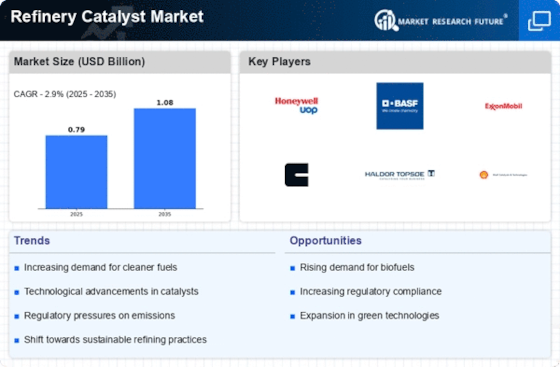Market Analysis
In-depth Analysis of Refinery Catalyst Market Industry Landscape
Refinery Catalyst's market dynamics are shaped by many factors that affect demand, supply, and the refining sector. Refinery catalysts improve efficiency, help produce cleaner fuels, and fulfill strict environmental criteria. The global energy situation, refining capacity increases, and the pursuit of cleaner and more sustainable fuel generation drive refinery catalyst demand. The refinery catalyst market is heavily influenced by the industry's focus on upgrading and optimizing operations to generate low-sulfur fuels.
Growing oil production capacities in developing country refineries generate market development and size potential. Business growth is influenced by clean petroleum product growth and oil and growth-related activities. These catalysts are in demand due to fuel sulfur limits to reduce pollution. As the car industry adopts cleaner, more fuel-efficient technology, hydroprocessing catalysts to make ultra-low sulfur diesel (ULSD) and other clean fuels will be in demand, affecting market dynamics.
FCC (Fluid Catalytic Cracking) catalysts are another important refinery catalyst class. FCC units are essential for turning heavy feedstocks into gasoline and olefins. FCC catalyst dynamics depend on gasoline demand, feedstock availability, and refining technology advances. FCC catalyst market dynamics are affected by transportation fuels and higher-octane gasoline demand.
Refinery catalyst supply is affected by catalyst formulations, raw material availability, and main market competitors' production capacities. Supply-side dynamics are affected by catalyst technology innovations such new formulations and materials. Catalyst manufacturing procedures and supply chain interruptions like raw material price changes or manufacturing issues can affect refinery catalyst availability and pricing, altering market dynamics.
Refinery catalyst market dynamics depend on regulations. Refineries must follow environmental laws, especially sulfur-reduction laws. Refinery catalyst markets can be affected by regulatory changes like stricter pollution requirements or cleaner fuel production rules. The global push toward a low-carbon economy and sustainable energy solutions emphasizes catalysts' role in environmental goals.
Refinery catalysts are part of the global energy supply chain, therefore global economic and trade policies affect their market dynamics. Economic growth, geopolitics, and trade agreements affect refining and catalyst demand. Currency exchange rates, oil price variations, and regional market dynamics may further complicate refinery catalyst pricing and availability worldwide."


















Leave a Comment